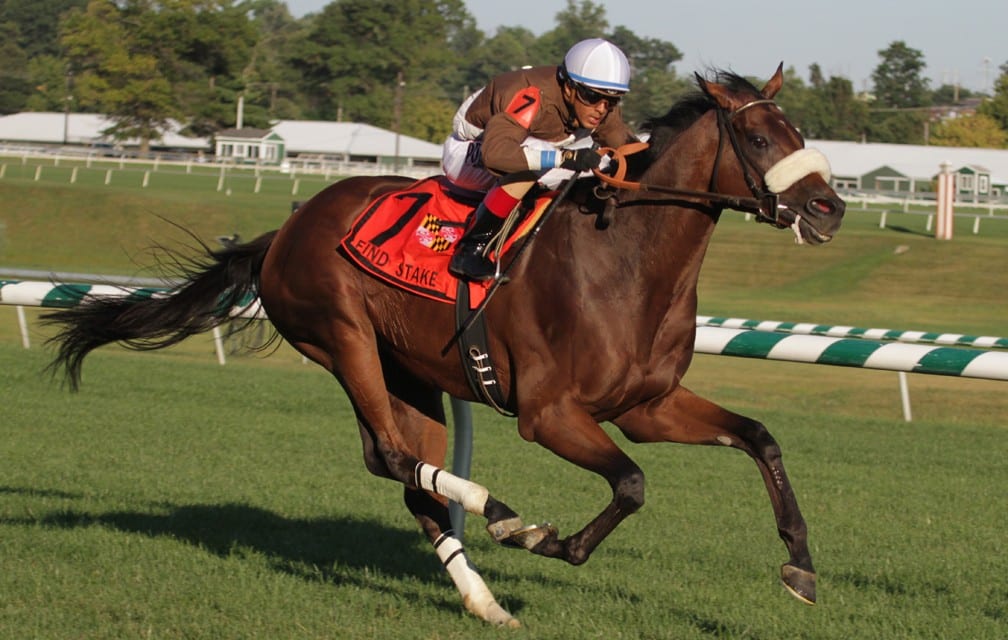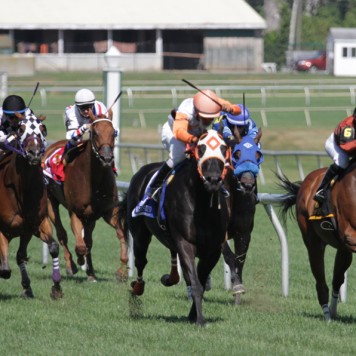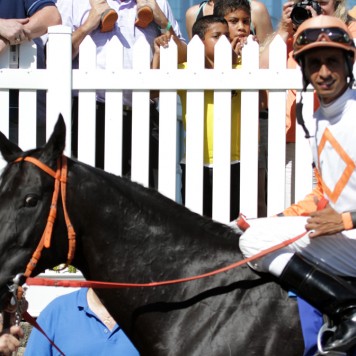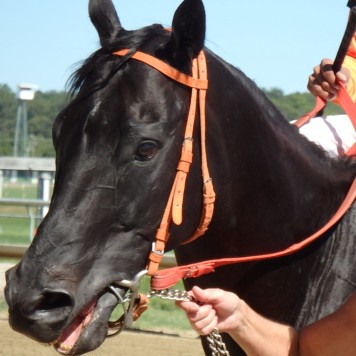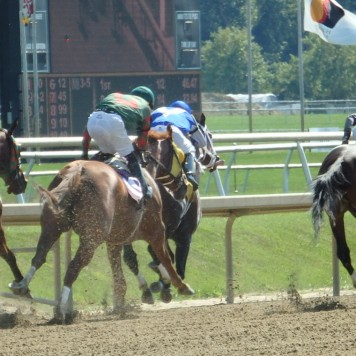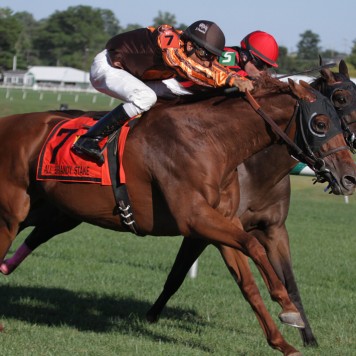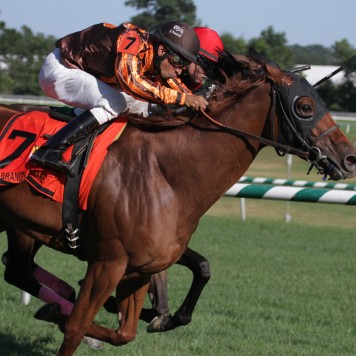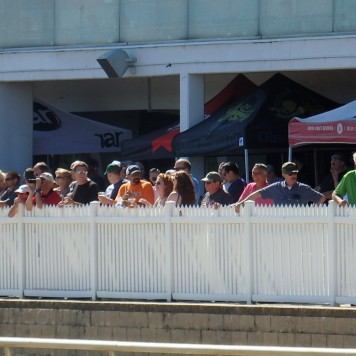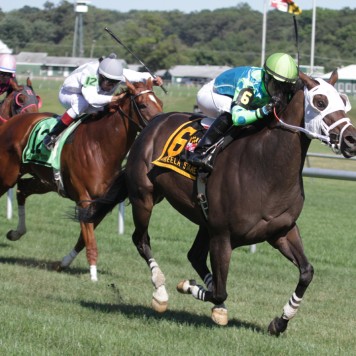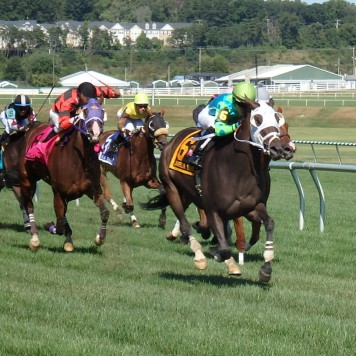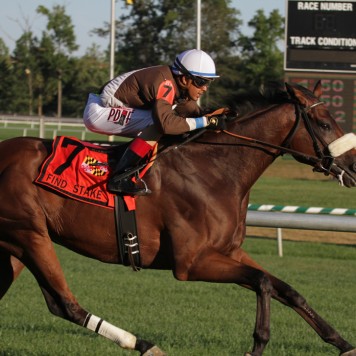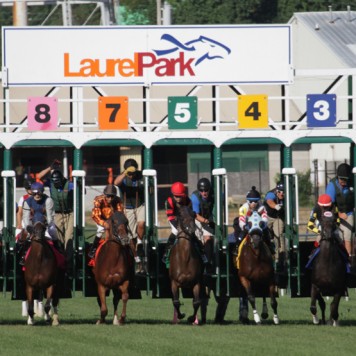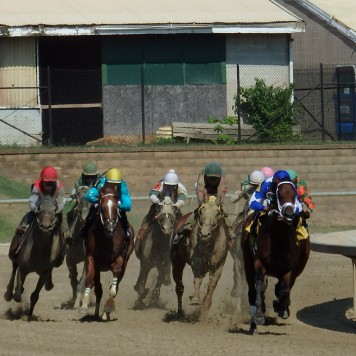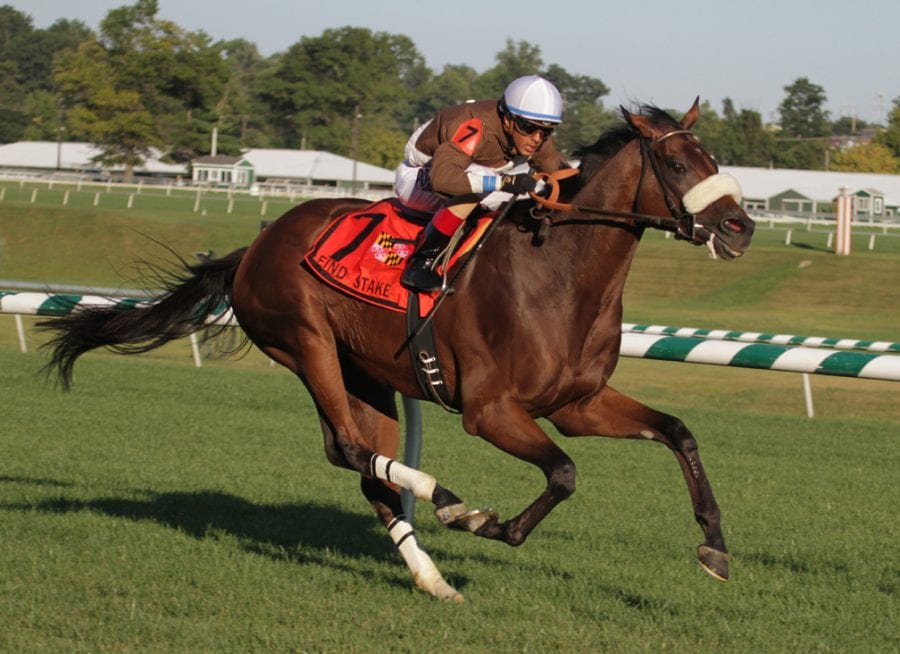
Phlash Phelps took the Phind…. err… Find Stakes. Photo by Laurie Asseo.
by Frank Vespe
“We didn’t know what this day would bring,” Maryland Jockey Club general manager Sal Sinatra said in the winner’s circle following Saturday’s Find Stakes, the final stake of the first Maryland Pride Day at Laurel Park. “But it was like a win-win-win. The moons aligned.”
Indeed.
Full fields abounded on the day reserved for Maryland-bred and Maryland-sired horses, and most of the races provided good betting opportunities. The four stakes were competitive, with three decided by less than a length.
The weather was postcard-perfect, and on a day when the track held a ceremony for octogenarian trainer King Leatherbury, inducted into the national racing Hall of Fame earlier this month, the King received the honor he (and the fans) wanted much more than a ceremony: his ageless Ben’s Cat delivered a sixth consecutive Mister Diz Stakes win.
All in all, 123 horses — an average of more than 11 per race — faced the starter, and Sinatra said that the track could actually have filled 13 races rather than the 11 it actually used, so robust were the entries.
And the handle? That topped $3 million, an amount not often seen in recent years at the Central Maryland track. According to the track, more than $1 million of that came on-track or within the Maryland network.
What’s more, the day resulted from a partnership involving the Maryland Horse Breeders Association, Maryland Million, the Maryland Thoroughbred Horsemen’s Association, and the Maryland Jockey Club — an industry-wide coalition that might have been hard to envision a couple of years ago.
No wonder Sinatra pronounced himself “delighted.”
Yet, while everyone was happy with the event — which Sinatra suggested would become an annual day but might in future years move to the spring at Pimlico — some of the challenges facing Maryland racing in general also were laid bare.
For one thing, there’s the matter of Maryland Million, the state’s signature fall racing day, which is generally reserved for Maryland-sired horses.
The universe of Maryland-sired horses has been shrinking over the years, a problem perhaps likely to be exacerbated with the recent retirement of longtime top regional sire Not for Love. Last year, Maryland Million allowed races to be opened up to Maryland-breds when the number of entries fell below a threshold level, which resulted in the day’s featured Classic including Maryland-breds.
“The concerning things is obviously the majority of the horses were Maryland-bred and not Maryland-sired on this card,” said Sinatra of Saturday’s races. “We’re a little concerned with the field size for Maryland Million because of the foal crop situation.”
David Hayden, who along with wife JoAnn owns Dark Hollow Farm, which bred and owned All Brandy winner Joy, concurred.
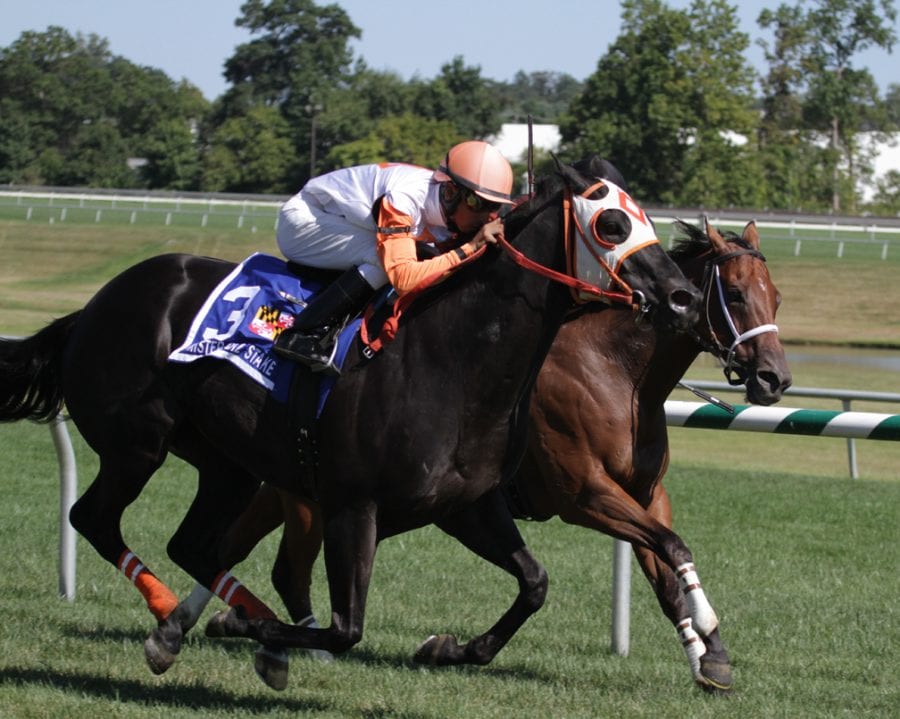
Ben’s Cat scored perhaps the day’s most popular victory, in the Mister Diz. Photo by Laurie Asseo.
“Just imagine, if you have 69 more horses running (on Maryland Million day), how many people is that going to bring to the racetrack?” he wondered. “How many more partnerships and what is your handle?”
Hayden has long been a vocal proponent of opening Maryland Million to Maryland-bred as well as -sired horses. His All Brandy winner Joy is a daughter of Kentucky-based stallion Pure Prize.
At the same time, however, Hayden makes an economic argument.
“If you want to have a big handle on Maryland Million day, you need to be more inclusive,” he said. “The people around here need to understand — particularly the breeders and the Maryland Million group — that the racetrack makes money on handle. They get no casino revenue. So anything that you can give to make the racetrack profitable, we have to do as horsemen, as Maryland breeders and Maryland owners. This should not be a closed shop; this should be open.”
Yet Maryland Million has long resisted calls to open up the program. They point out that the program was modeled on Breeders’ Cup, itself sire-driven. And they note that Maryland Million serves as a complement to the state’s Maryland-bred program, providing stallion owners a focal point.
They can also point out that, even if the quantity of Maryland-sired runners has taken a hit over the years, the quality remains solid. Three of the four Maryland Pride Day stakes were won by Maryland Million-eligible runners.
Beyond Maryland Million, then there’s the question of a broader state-bred racing initiative. While Maryland has long had stakes races restricted to state-breds, it has remained without additional categories of state-bred races, even while tracks in West Virginia, Pennsylvania, and New Jersey have adopted increasingly comprehensive racing programs for horses bred in those states.
On Saturday the seven non-stakes for Maryland-bred and -sired horses drew an average of more than 12 horses each, which some think helps make the case for adding new state-bred events to the year-round program.
The MJC’s Sinatra is one who sees benefit in a state-bred racing program.
“I’m somewhat of a proponent of it for a couple reasons,” he said. “I’m not one of these people who want to see every category of state-bred, but I definitely would like to see that a-other-than (first level allowance), which filled, and the maiden special. those are the two keys, especially for the babies.”
Sinatra makes the point that a limited program can reward breeders and owners while improving the overall breeding industry.
“If you’re trying to get people to breed and put the money out for the whole process, those two will encourage them,” he said.
Hayden, on the other hand, parts ways with many in the state’s horse breeding community and is dubious about launching such a program.
“I think you can have days like today,” he said. “Once this day was announced, people held horses back for today. But if you have a situation where you’re going to intersperse them like one every week or one every two weeks, it’s very hard to get people energized about that.”
Who’s right, of course, is unclear. What is clear is that Saturday’s foray into a state-bred day was a major success, and there appears to be little disagreement about that.
“I said to (state Racing Commission chairman) Bruce Quade, ‘You should be proud of the day,'” Sinatra said. “All the groups worked together, everybody chipped in. And then everybody felt good.”
“From where I’m sitting,” Hayden said, “when you look at the number of entries, it’s terrific. It’s a terrific day for Maryland.”
MARYLAND PRIDE DAY PHOTO GALLERY

